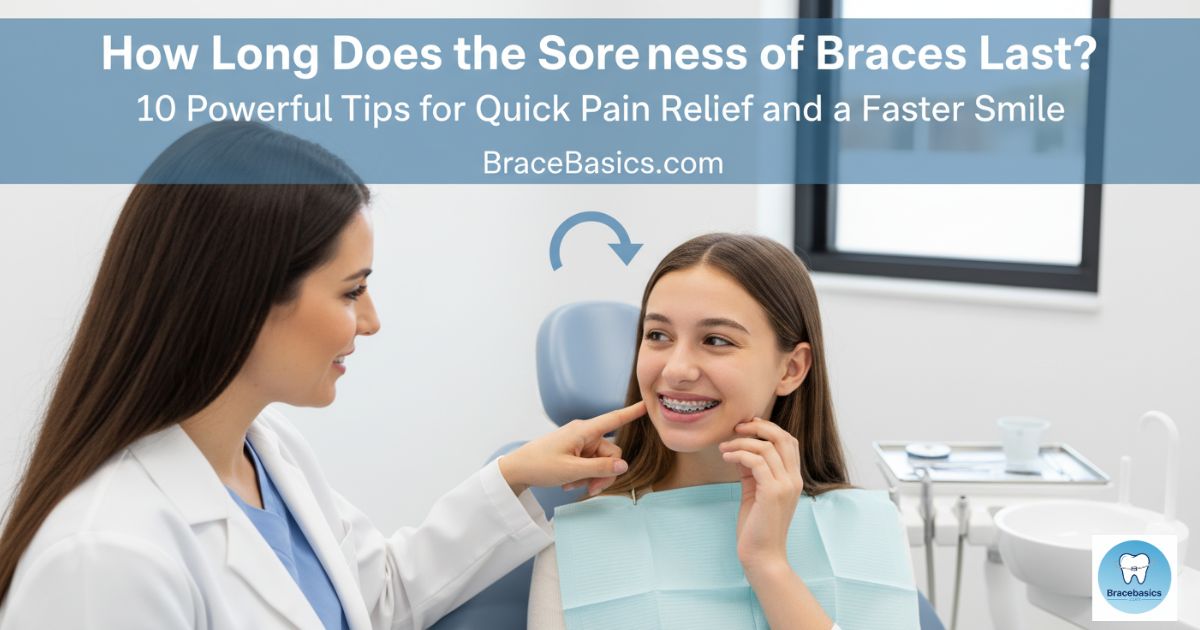Getting braces is one of the best decisions for a healthy, confident smile. But if you’ve just started your orthodontic journey, there’s one question that likely comes to mind—how long does the soreness of braces last? The good news is that the discomfort doesn’t stick around forever. What you feel in the beginning is simply your mouth adjusting to something new.
The soreness comes in waves and usually fades before you even realize it. Still, knowing what causes soreness after braces and how to soothe it makes a big difference. Let’s explore how your body reacts, how long braces pain duration really lasts, and what you can do to feel better faster.
How Long Does the Soreness of Braces Last? Short Answer
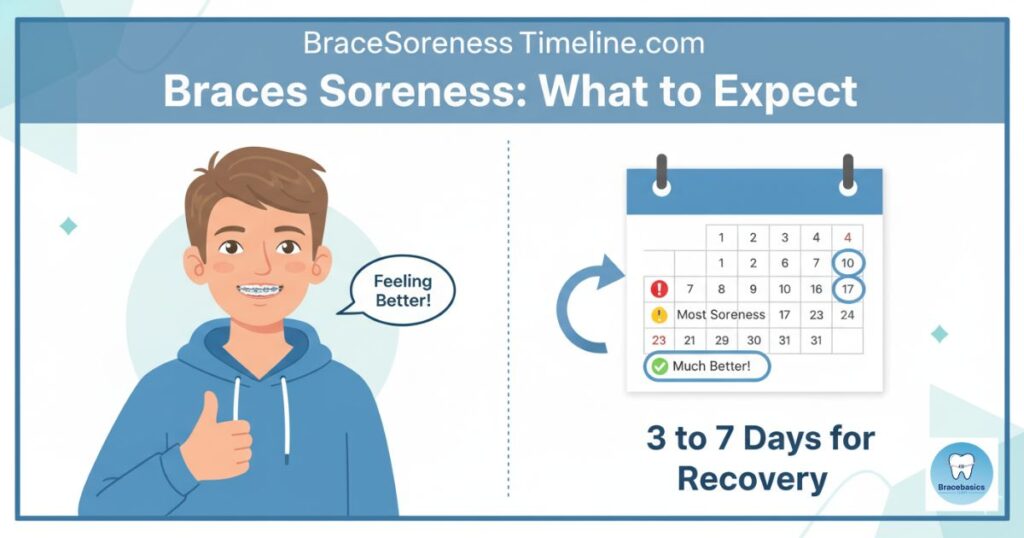
The soreness from braces usually lasts about 3 to 7 days after they’re first applied or tightened. During this time, you might feel mild pressure or tenderness as your teeth start shifting. Most people notice the pain easing after a few days, and your mouth fully adjusts within one to two weeks. Each adjustment later tends to hurt less as your teeth and gums get used to the process.
Understanding Braces Soreness

When braces are first placed, your teeth, gums, and the tiny ligaments that hold each tooth begin adjusting to steady pressure. That pressure is what gently moves your teeth into better alignment. Think of it like muscle soreness after a workout—your body is responding and growing stronger. The same happens in your mouth, only it’s your ligaments and bone adapting to change.
You might also notice irritation on your lips, cheeks, or tongue in the first few days. That’s because the brackets and wires are new to your mouth and may rub against the soft tissues. This kind of orthodontic treatment soreness usually feels like a dull ache or a bruise inside your mouth. It may sound unpleasant, but it’s temporary and part of the normal healing process.
When Does Braces Soreness Start?
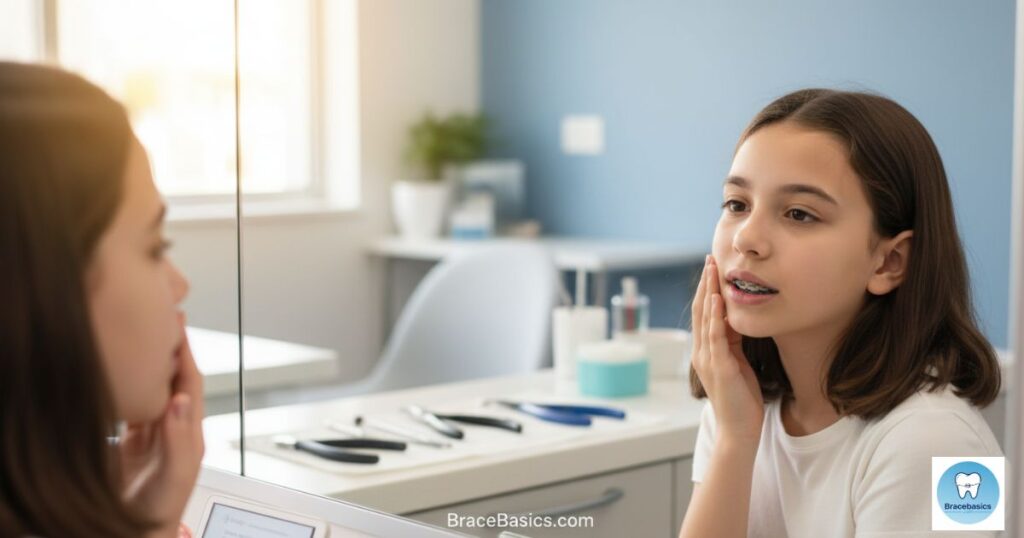
Usually, soreness begins four to six hours after the braces are applied or adjusted. At first, you might feel nothing when you leave your orthodontist’s office, then later the braces pressure discomfort gradually appears. It can feel like a tight or aching sensation, especially when biting or chewing.
Two things cause this:
- Tooth movement — the ligaments stretch as the braces guide your teeth.
- Soft-tissue irritation — brackets and wires rub the cheeks or gums.
This combination explains why braces hurt so much in the beginning. Don’t worry—your mouth gets used to it fairly quickly.
How Long Does the Soreness of Braces Last?
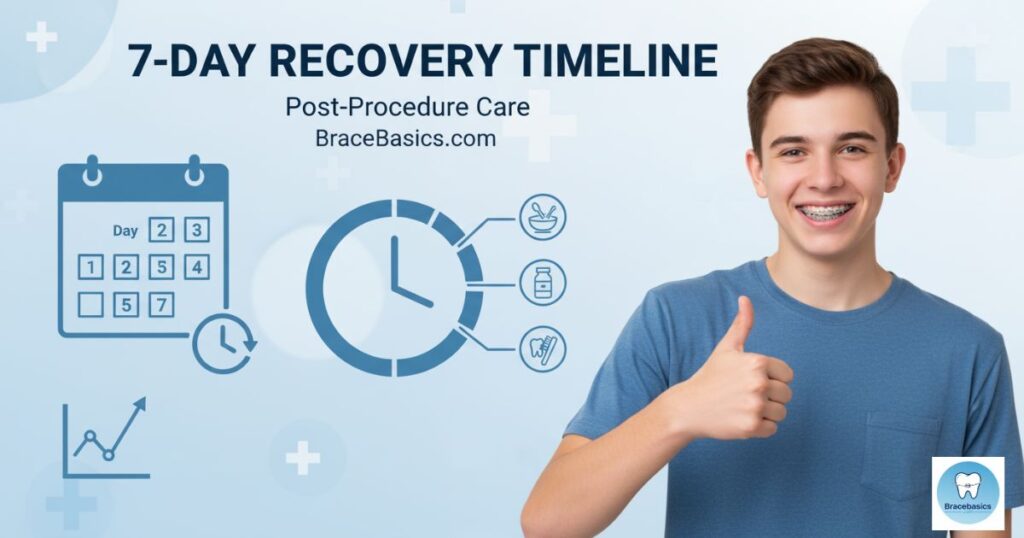
For most people, braces pain duration lasts around three to seven days after first placement. The first twenty-four to forty-eight hours are usually the toughest, then the ache gradually fades. Some patients describe it as mild tenderness when biting down, rather than sharp pain.
After each adjustment or tightening, you might feel orthodontic adjustment soreness for one to three days. These short bursts of tenderness happen as your orthodontist activates new pressure points to continue the shifting process. Over time, your teeth and ligaments adapt so each adjustment feels easier than the last.
A few people experience mild gum soreness from braces or a dull awareness for up to three weeks, but that’s rare. Here’s a simple reference chart:
| Stage | Average Soreness Duration | What You’ll Notice |
|---|---|---|
| First day after placement | Begins 4–6 hours later | Pressure and aching sensation |
| First week | 3–7 days | Peak discomfort, then eases |
| After adjustment | 1–3 days | Mild tenderness or tightness |
| Adaptation period | Up to 3 weeks | Slight awareness, no real pain |
In short, how long braces pain lasts depends on your body’s natural healing pace, the type of braces you wear, and how well you care for your mouth afterward.
Tips to Relieve Braces Soreness
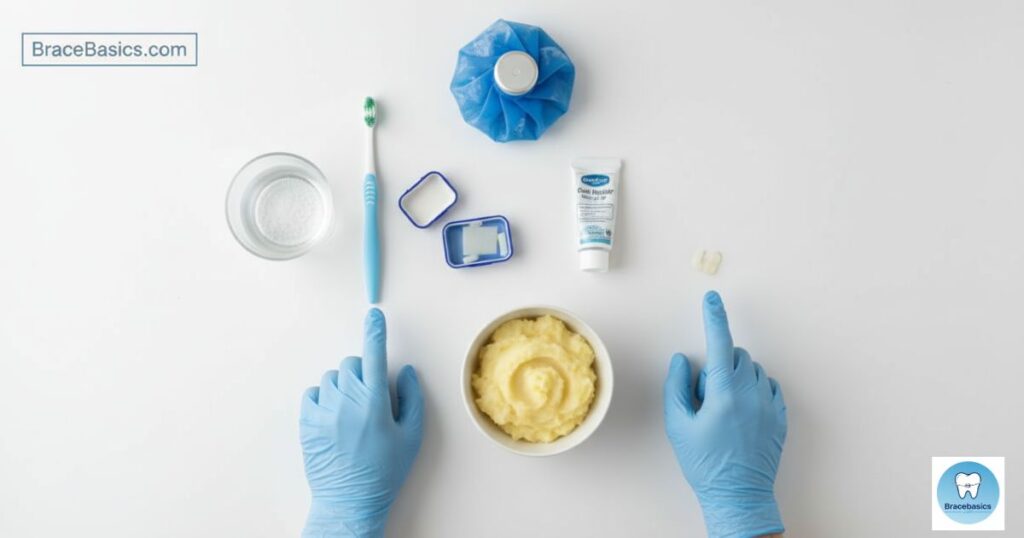
There’s no need to simply suffer through it. A few small habits can make your adjustment phase much easier and help stop braces from hurting faster.
Start with your diet. During the first week with braces, stick to soft foods like mashed potatoes, yogurt, smoothies, scrambled eggs, or soup. These are gentle on teeth and give your mouth time to rest. Once the soreness fades, gradually reintroduce normal foods—just skip anything sticky or crunchy for now.
Pain relievers such as ibuprofen or acetaminophen help manage braces discomfort relief. Taking one right after your appointment can help prevent the ache from peaking later. Always follow the dosage and your orthodontist’s instructions.
If a bracket or wire irritates your cheek or gums, use orthodontic wax to cover it. It forms a small cushion that stops rubbing and lets the area heal. Another excellent trick is a warm salt-water rinse: mix half a teaspoon of salt in a glass of warm water, swish for thirty seconds, and spit it out. Do this twice a day for natural braces pain home remedies.
A cold compress also helps reduce swelling. Hold one outside your cheek for ten minutes at a time. For stubborn sore spots, a numbing gel can be used safely—just check with your orthodontist first. Finally, keep your braces clean. Good brushing and flossing prevent swelling or infection, which can worsen orthodontic pain.
Others 10 Powerful Tips for Quick Pain Relief and a Faster Smile
Here are 10 powerful tips for quick pain relief and a faster smile when dealing with braces soreness:
- Stick to soft foods like mashed potatoes, yogurt, and soups during the first few days.
- Use orthodontic wax to prevent wires and brackets from irritating your cheeks and gums.
- Take over-the-counter pain relievers such as ibuprofen or acetaminophen (as directed).
- Rinse with warm salt water to reduce swelling and soothe sore gums.
- Apply a cold compress or ice pack to the outside of your mouth for 10–15 minutes.
- Use numbing gels (like Orajel) for temporary relief from sharp pain spots.
- Practice good oral hygiene to prevent inflammation that can worsen soreness.
- Avoid crunchy or sticky foods that can cause extra pressure on your teeth.
- Gently massage your gums with your fingers to improve blood flow and ease discomfort.
- Stay consistent with orthodontic appointments so your braces progress smoothly and pain reduces over time.
When Should You Call Your Orthodontist?
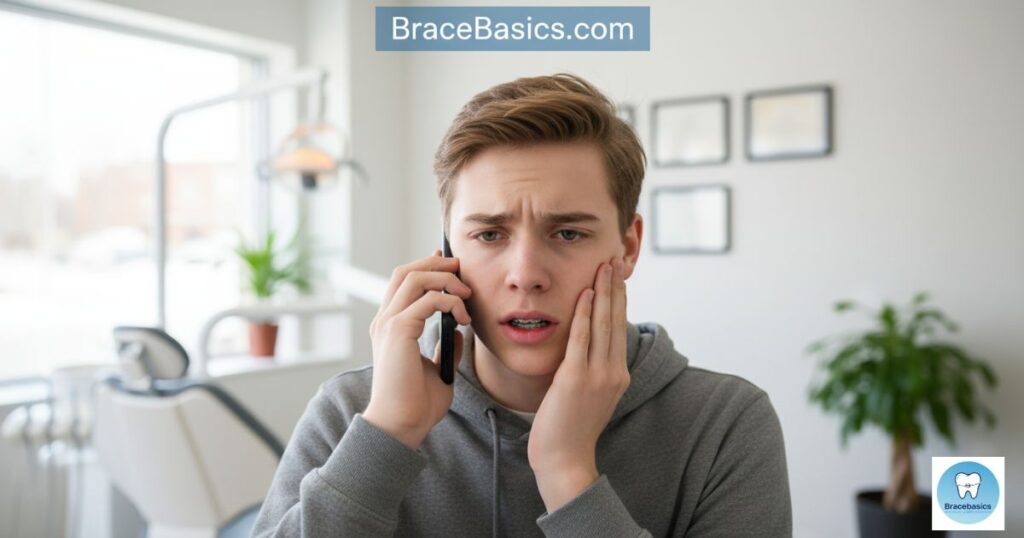
While soreness is normal, intense or lingering pain isn’t. You should contact your orthodontist if discomfort lasts longer than a week, if a wire or bracket breaks, or if you notice swelling, bleeding, or pus. Those signs may suggest an infection or mechanical issue.
Another clue is when you can’t eat, talk, or sleep properly because of pain. That level of discomfort isn’t typical. Your orthodontist can fix loose parts, smooth sharp wires, or check for unusual pressure points. It’s better to ask early than to push through unnecessary braces side effects.
Living Through the First Week with Braces
Your first week sets the tone for the rest of your orthodontic pain management journey. Remember, what you’re feeling isn’t unusual—it’s your mouth’s way of adapting. Eat soft foods, drink plenty of water, and rest your jaw. A warm compress before bed can also calm muscles and help you sleep better.
During this time, focus on learning proper cleaning routines. Food can easily get stuck between wires, causing irritation or bad breath. Using a small interdental brush or water flosser helps reach tight spots. Good hygiene reduces how long discomfort lasts with new braces by keeping your gums healthy and free from inflammation.
Many patients notice that every tightening session becomes easier. Your teeth move less dramatically each time, and your mouth becomes accustomed to the process. That’s why later adjustments bring less braces pain after tightening and quicker recovery.
Why This Soreness Is Actually a Good Sign
It might sound strange, but the ache means progress. Each tiny shift in tooth position happens because of controlled pressure. That’s why orthodontists often say teeth shifting pain is proof that your braces are working. The soreness reflects microscopic bone remodeling beneath your gums.
As your mouth adjusts, the discomfort fades but your teeth continue moving quietly. So instead of viewing the ache as a problem, see it as your body’s signal that realignment is underway. This perspective can make those few sore days easier to handle.
The Science Behind Braces Pain
Orthodontists explain that braces pressure discomfort stems from inflammation in the periodontal ligament. When force is applied, tiny blood vessels compress, triggering a mild inflammatory response. This signals bone cells to resorb on one side of the tooth and build on the other, allowing movement.
This process is safe and fully reversible. Once the pressure normalizes, blood flow returns, and the soreness stops. That’s why how long braces hurt has a natural endpoint—it’s biologically timed. Your orthodontist adjusts the pressure in measured doses to keep this process controlled and comfortable.
Case Study Example
Take Maria, a 16-year-old high school student from Illinois. She described the first week with braces as “the weirdest part,” feeling tightness and soreness that made her prefer soups and yogurt. By day six, she noticed she could chew again without wincing. After her second adjustment, the soreness lasted only two days.
Her orthodontist explained that her experience was textbook-typical: strong ache in the beginning, soft tenderness later. Like Maria, most patients report the second and third adjustments bring far less braces pain duration, proving the mouth’s remarkable ability to adapt.
What to Expect After Getting Braces
Expect a learning curve—nothing more. The first few days bring noticeable pressure, then the body adapts. You might find brushing takes longer, or certain foods feel odd at first. With patience and proper care, this routine quickly becomes second nature.
What to expect after getting braces also includes small milestones: less irritation, smoother speech, and eventually the excitement of seeing your teeth straighten. Each improvement is a step toward the confident smile you’re aiming for.
FAQs
How long does it take for braces to stop hurting?
Braces usually stop hurting within 3 to 7 days after they’re first applied or adjusted. Most discomfort fades as your mouth adapts.
How long does it take to adjust to braces?
Most people adjust within about three weeks. The how long does it take to adjust to braces phase varies, but after the first week, you’ll notice the soreness dropping off sharply.
Do braces hurt every day?
Not at all. Braces pain after tightening shows up only after new pressure is applied. The rest of the time, your teeth simply feel normal.
Can I eat normally with braces?
You can—but only after the soreness eases. Stick to soft foods early on, then slowly return to regular meals. Avoid hard snacks like nuts or candy, which can cause damage and more braces tightening discomfort.
What helps with braces pain?
Warm salt water, orthodontic wax, over-the-counter pain relief, and cold compresses all work. Soft foods and good hygiene also reduce how to relieve braces pain naturally.
How to soothe sore gums from braces?
Rinsing with salt water, using wax, and applying gel can calm sore spots. Massaging your gums gently with a clean finger also boosts blood flow and eases pressure.
What painkillers can I take for braces?
Common non-prescription options like acetaminophen or ibuprofen work well. Take them as directed, ideally before the pain peaks. Always confirm with your orthodontist if you’re unsure.
Do rubber bands make braces hurt more?
Yes, temporarily. Rubber bands add new tension, which can trigger orthodontic adjustment soreness. The ache fades within a couple of days as your teeth settle into position.
When should I call my orthodontist about pain?
If soreness turns into sharp pain, lasts beyond a week, or you notice swelling, bleeding, or broken wires, contact your orthodontist right away.
Conclusion
So, how long does the soreness of braces last? For most people, only a few days to a week. After that, your teeth and gums settle into the new rhythm, and the tenderness fades away. With each adjustment, discomfort becomes milder and easier to manage.
Keep up good oral care, eat smart, and use simple home remedies whenever needed. Remember—this temporary orthodontic pain leads to a permanent reward: a straight, healthy smile that lasts for life. Every small ache today builds the confident grin you’ll love tomorrow.
References
- American Association of Orthodontists
- Colgate Oral Care Center
- Healthline – How Long Do Braces Hurt?
- WebMD – Braces Overview
- Mayo Clinic – Orthodontic Care
- Cleveland Clinic – Dental Health

Hi, I’m Dr. Martin, the founder of BraceBasics.com. With years of experience in orthodontics, I’ve made it my mission to simplify braces care for patients of all ages. Here, you’ll find easy-to-understand advice, practical tips, and reliable resources to make your braces journey smoother, healthier, and stress-free. My goal is to help you smile with confidence every step of the way.

